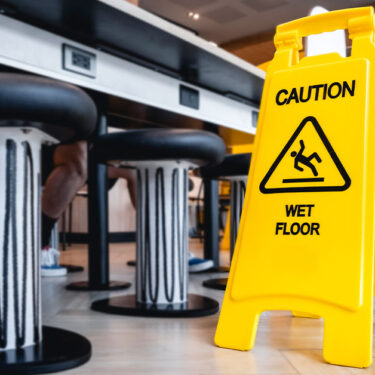A woman who fell off her bike and was injured while leaving her workplace at the University of California will be eligible for Workers Compensation but cannot sue her employer for negligence, an appeals court ruled. Based on the “premises line” rule, the employee was still engaged in the course of her employment when the accident occurred, as she was still on the employer’s property, the Society for Human Resource Management reported on Nov. 9.
Featured Solutions
“If you are eligible for Workers Compensation, you get those benefits but you cannot sue your employer,” said Justin Dorman, National Product Manager, Workers’ Compensation, Burns & Wilcox, Charleston, South Carolina. “That helps protect businesses from massive financial damage.”

It is not white and black — there is always going to be that gray area. You never know what is going to happen in a court of law.
Each state has its own laws on Workers Compensation Insurance claims, though some “gray areas” remain, said Morgan McCoy, Underwriter, Workers’ Compensation, Burns & Wilcox, Charleston, South Carolina.
“It is not white and black — there is always going to be that gray area,” McCoy said. “You never know what is going to happen in a court of law. It is really on a state-by-state, case-by-case basis.”
Determining when an employee is ‘at work’
Although an employee would not usually be covered by Workers Compensation Insurance while traveling to or from work, courts in California have established that an employee’s work technically begins when they enter the employer’s premises and ends when they have left the premises, SHRM reported. State guidelines vary, and in New Jersey courts are currently weighing an appeal over whether a worker injured on his commute should be eligible for Workers Compensation, Law.com reported in September.
“Every state is going to have a different definition of when a job starts and when a job ends and when you are eligible for Workers Compensation and when you are not,” Dorman said. “If you come to work, park your car, and slip and fall on ice before you enter the building, there is that gray area. Did your job begin yet? The same goes for a lunch break. When you go to lunch, are you still currently under the scope of employment?”

Every state is going to have a different definition of when a job starts and when a job ends and when you are eligible for Workers Compensation.
According to Dorman, “these types of questions and concerns come up all the time.”
Being injured after work hours while still on a company’s property is not unheard of; for example, Insurance Business reported in March that Workers Compensation claims from e-scooter incidents have tripled over the past three years, with 36% of these crashes occurring on the way to work and 29% on the way home.
The question of whether or not an injured worker was hurt in the course of their employment comes up often, McCoy agreed. For example, he referenced a claim in California in which a retail store worker was found to be eligible for Workers Compensation after being injured in a mall common area.
“Because she was forced to walk through the mall to get to her job, and there was not a back entrance, they had to pay the claim out,” McCoy said. “It was not in the employer’s hands as much as something would be if it was on their property. Every case is a little bit different.”
Uncertainty surrounding workplace injuries has also arisen over the increase in remote work. As of March, a Pew Research Center poll found that about a third of workers whose jobs could be done remotely were working from home, compared to just 7% prior to the pandemic.
“When you work from home, it is very hard to tell when you are working and not working. You are not just sitting around the computer for eight hours,” Dorman said, pointing to household tasks like lawn mowing and laundry that could take place during work hours. “Working from home has made it a little more difficult, and I know some states are trying to define that more clearly.”
To address this potential gray area, some employers have suggested video monitoring of employees’ workstations, McCoy said. “Remote work is one of those things that insurance carriers overall are trying to figure their way through,” he said. “It is in its infancy as far as what employers are doing.”
‘Each state is going to be different’
Employers should familiarize themselves with their state’s specific regulations on Workers Compensation, knowing that some states “may be a little more hazy” on what counts as being in the course of a worker’s employment, Dorman said. They should also be careful about requiring employees to run errands or attend outside-of-work functions. “If the boss says to pick up donuts on your way to work and you get in a car wreck on the way, are you under the course of employment? In some states, they are going to pay out Workers Compensation on that,” he said.
“Each state is going to be different,” McCoy added. “They all have different laws.”
Despite being regulated by individual states, Workers Compensation Insurance is generally “very straightforward,” McCoy said. It provides payments for an injured worker’s medical treatment, a portion of lost wages, rehabilitation and other expenses.
“Whenever an employee is injured, they can go to a hospital or an urgent care and it is going to be covered. It is pretty simplistic in that way,” Dorman said. “Whether it is a restaurant or a warehouse, it is all generally the same coverage.”
This policy is always triggered first when a worker is injured, although further liability claims are possible in some cases and could be covered by the employer liability portion of a Workers Compensation Insurance policy, or a company’s Commercial General Liability (CGL) Insurance and other policies.
“It is very rare that you can sue the employer” after an injury, Dorman noted, and would typically only apply in cases where an employer maliciously or purposely put a worker in harm’s way. “For example, if they purposely did not maintain equipment, they knew about it and they did not take any steps to make sure the equipment was safe, that is when you can potentially sue the employer,” he said. “You see that less and less.”
This distinction gives Workers Compensation Insurance “a very important role in business in general,” Dorman said, as it provides coverage for employees who get hurt while also shielding businesses from further financial risk.
It is important for business owners to research the Workers Compensation laws in their state and “err on the side of caution” when it comes to workplace safety and asking employees to conduct tasks outside of work, Dorman said. “If you live in a colder climate and there is ice, make sure the parking lots are as safe as possible, because those falls can end up on your Workers Compensation,” he said. After-work parties or outings to sports games could also be considered part of a worker’s job if attendance is required or highly encouraged. “Be careful about what you are mandating and let your employees know what is voluntary. Make sure those lines are clear.”
Premiums continue to decline for Workers Compensation Insurance
Being safe at work is more important than ever for U.S. workers, according to an employee safety study released earlier this year, and 90% of workers said their company has a legal and moral duty to protect employees from unnecessary risk of harm on the job, EHS Today reported in March. Only about 54% of employees felt their safety was extremely important to their employer, and just 56% of workers had participated in a safety training more than once per year.

This soft market is historic — we are going on 10 years straight of declining rates in most states.
Avoiding workplace injuries starts with having safety guidelines and procedures in place. “One thing insurance carriers like employers to have is a safety manual with written employee guidelines,” McCoy said. “A lot of those will have entry and exit protocols and what the employees are supposed to do in an emergency.”
Employers can also take advantage of risk management services available through their Workers Compensation Insurance carrier, including loss control inspections. “The majority of carriers now have a lot of hands-on tools employers can use as far as loss control. They can help the employer become as safety-conscious as possible,” McCoy said. “Carriers have figured out that this helps bring down their losses.”
It is also important for employers to submit any potential injury claims as quickly as possible, Dorman pointed out.
“If employees are injured, even if it may be a question of whether it will be covered or if they were working or not working, always file it. Always send in a claim at your earliest convenience,” he said. “Some employers do not like to file potential claims because they think it is going to hurt them. It really does not. The carriers appreciate getting it as early as possible, even if it turns out not to be a claim at all.”
The current market for Workers’ Compensation Insurance makes it a good time for companies to shop for a policy, Dorman and McCoy agreed. “This soft market is historic — we are going on 10 years straight of declining rates in most states,” Dorman said. “Prices are still falling and should continue to fall. This is the best time for employers to save on their Workers Compensation Insurance.”

Even if it is a smaller company and it is not required, I would strongly recommend having Workers Compensation Insurance. Without it, you could end up having to pay out a claim and it could put you out of business.
According to McCoy, the continually declining rates “has never happened before.”
“It is definitely a great time to buy as far as premiums go,” he said. “If an employer has hired the amount of employees to where the state requires them to have the coverage, they need to make sure they purchase it. Even if it is a smaller company and it is not required, I would strongly recommend having Workers Compensation Insurance. Without it, you could end up having to pay out a claim and it could put you out of business. I would not leave myself open to something like that.”







